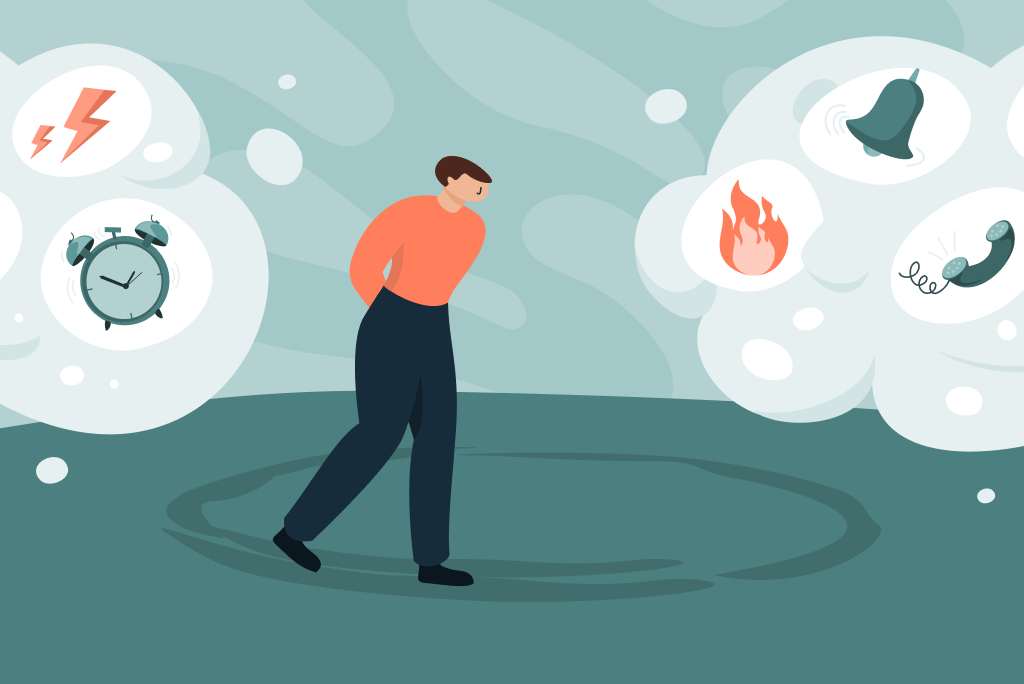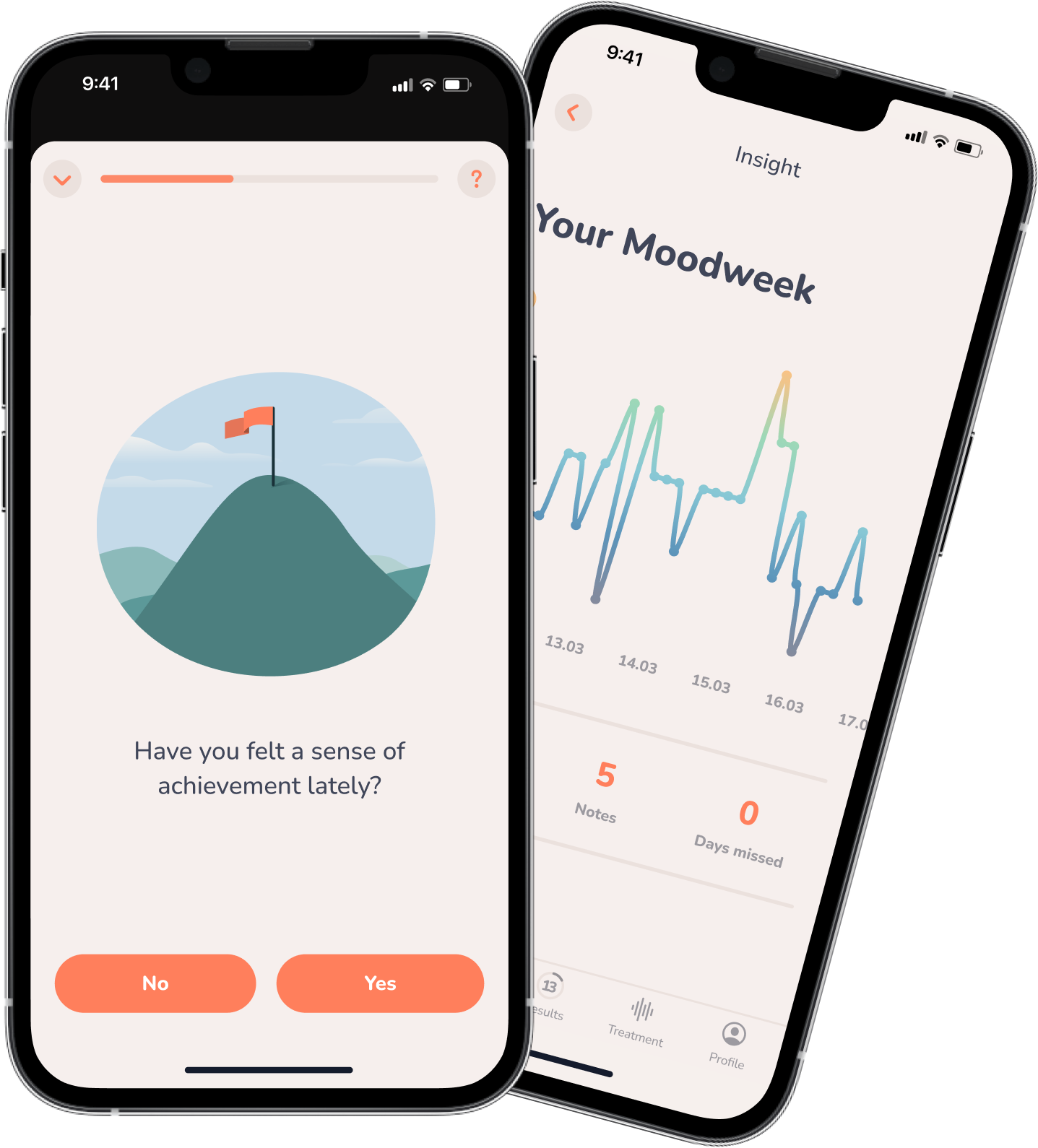Insight
Looping Thoughts: Questions and Answers on the Subject of Rumination
Every person has thousands of thoughts running through their head every day. For some, this means getting tangled up in looping and repeating thoughts. In this article, we answer the most important questions about rumination.

What’s the difference between “normal” thinking and rumination?
When a problem arises, naturally you think about it as you try to work out a solution. You’ve made a pretty big mistake at work, for example, so you think through what happened and what you could do differently going forward. Once you’ve figured this out, you move on. This is all “normal” and helpful.
But let’s say you made that mistake at work a week ago, a month ago, or even years ago and you find your thoughts returning to it again and again. For the fifth, tenth, or thousandth time, your thoughts turn to what happened along with things like, “Ugh, this is so typical of me!” “Why does this always happen to me?” “I wonder if everyone at work associates me with that mistake.” “I bet that’s why I didn’t get that promotion.” “Why didn’t I notice the problem earlier?” And so the thoughts go, like a merry-go-round, circling again and again without arriving at a constructive resolution and leaving you in a bad mood or feeling exhausted. This is rumination.
What are typical topics of ruminating thoughts?
Rumination often revolves around the causes and consequences of negative feelings and distress. The looping thoughts might come in the form of large life questions such as “Why am I still single?” or “Will I ever find a job with the grades I earned?” or “Why does no one ever understand me?”—in other words, thoughts related to worries or distress about the way things are or will be.
Social situations can also set the carousel of thoughts in motion: “Jane didn’t say hello to me this morning. She probably doesn’t like me anymore. Maybe I said something wrong the other day.” Permanent and pervasive thoughts such as “Nothing ever works out for me” or “I’m a real master at putting my foot in my mouth” are also pretty common of rumination.
Thoughts that revolve around the past are another subset of ruminating thoughts. Usually, it’s events that have already happened and can’t be changed but which a person, nevertheless, can’t let go of.
Whether revolving around the way it is, will be, or was, what all ruminating thoughts have in common is that they repeat without bringing new insights or solutions.
Why does anyone ruminate at all?
If rumination has so many disadvantages, why do so many people do it? There are several explanations for this. For one, rumination gives the false sense of control in the appearance of actually working through a problem—this can initially lead to feelings of relief. Except that because no true action or solution comes out of rumination, this relief is only temporary.
Rumination can also be, somewhat ironically, a way to avoid the most painful feelings associated with a thought or event because it masks as action. Except, again, there is no true action, only the sense that one is working cognitively toward action—focusing on thoughts in this way can mean sidestepping deeper feelings.
Then there are a good number of people who don’t recognize their rumination when it’s happening. This is also quite common and understandable, and once the carousel of thought gets going, it can be really hard to get off.
Finally, rumination can be part of a mental illness, which we’ll come back to later.
What are the consequences of these thought loops?
Rumination can be draining and cause a bad mood. But that’s not all. Intense rumination can also trigger a stress reaction in the body, which can bring tense muscles, difficulty concentrating, sleep problems, headaches, loss of appetite, or even a weakened immune system, when prolonged. Because rumination often involves negative judgments about oneself or others, self-esteem can also suffer. Additionally, feelings of helplessness can arise in the face of never coming to a solution or constructive action.
How is rumination related to depression?
Rumination itself is not an illness. However, people who ruminate a lot have an increased risk of mental illness—especially depression. Ruminating can affect mood and energy levels and lead many to withdraw. All this can spark even more rumination, more sadness, and even lower energy levels, kicking off a vicious cycle as well as a depressive episode.
Rumination not only plays a role in the development of depression, it can also occur as a symptom of depression. During a depressive episode, one’s view of themself, others, and the world is usually quite negative, which can more quickly spark the negative looping thoughts of rumination and serve to perpetuate the depression.
This does not mean, however, that every person who gets tangled in looping thoughts will develop depression. The onset of depression occurs when a number of factors come together—rumination is only one such factor.
How can rumination be stopped?
Finally to the good news: Rumination is nothing more than a thinking habit. And though habits can be very persistent, it is possible to break them. But how?
The very first and most important step is to catch yourself ruminating. Only with recognition can you bring change. So begin to notice your thoughts. When and where do you usually ruminate and what topics do you tend to ruminate about? At first, you may only notice ruminating thoughts after the fact, or once a thought has repeated a bunch of times. All completely normal. But with a little patience, you’ll begin to notice the looping thoughts earlier and earlier.
Once you notice you’ve been in your head for a while, consciously pause and check: “Is there an answer to the questions I’m asking myself?” “Am I moving toward a solution right now?”
If the answer is no, choose a thought-stopping technique, such as an action you take to interrupt the ruminating thought. You can come up with anything here but one suggestion is to clap your hands and shout “Stop!”
Then once you’ve interrupted the thought, choose an activity that redirects your attention elsewhere. This will help stop you from going right back to ruminating once the shock of the interruption has passed. Again, the activity you choose could be anything that directs your attention elsewhere, but some suggestions could be making yourself a cup of tea, talking to someone, or solving a puzzle.
Aside from interruption and redirecting attention, another way to deal with rumination could be to schedule a set “rumination time” into your day. Find a place that’s as uncomfortable as possible such as on the hard floor or in a chair you wouldn’t usually sit in. The idea is that you don’t want to associate this place with relaxation and comfort. Then set a timer for 10 to 15 minutes and allow yourself to ruminate. Once time is up, immediately move on to another activity that engages your brain and stops the ruminating. This technique allows some controlled space for ruminating and deters getting overwhelmed by it.
By the way, you can learn more about these and other strategies in the MindDoc app. The course “Stop Looping Thoughts” provides detailed, step-by-step guidance on how to get rid of this distressing thinking habit.
When is professional support recommended?
Most people fall into ruminating from time to time. However, if it turns from an occasional annoyance into a state of being that regularly impacts your quality of life, it’s probably time to seek help. This can be a gradual shift so read through the points in the list to help you determine if you might benefit from the support of a mental health professional:
- You ruminate regularly and/or more frequently than before.
- Your rumination is weighing you down.
- Your rumination limits you in your everyday life (for example, you’re finding it difficult to concentrate because of it).
- You often feel down and/or lack energy.
- Your sleep is repeatedly disturbed by rumination.
- You have already tried several strategies to stop your rumination, but are not having success.

People-Pleasing — When the Fear of Rejection Becomes a Trap
Are you a person who places a high value on kindness, consideration and helpfulness? Or … maybe you tend toward what’s called “people-pleasing”?

Psychological Needs in the Workplace: How to Meet Them
Deadlines, conflicts, pressure to perform—many people grapple with stressors at work. The extent to which these weigh on someone depends in large part on whether psychological needs are being met at work.

High-Functioning Depression: The Hidden Suffering
When people think of depression, usually intense sadness, low energy, social withdrawal, difficulty getting out of bed, and managing daily life come to mind. But this is not always the case.

Obsessive-Compulsive Disorder: When Thoughts and Actions Become Torture
In this article, we explore what characterizes such thoughts and behaviors as well as how they can be treated.



